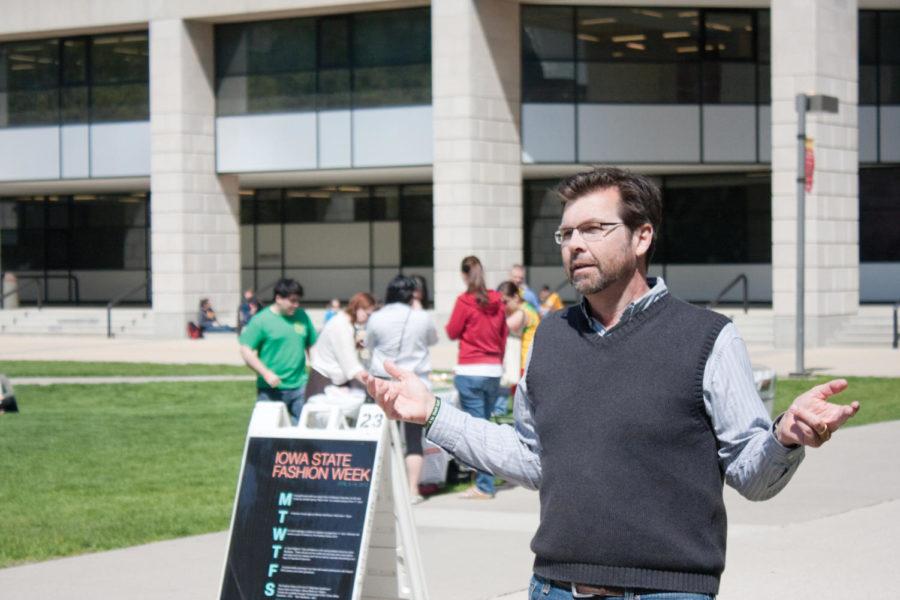Editorial: University attitudes limit free speech
Photo: Andrew Clawson/Iowa State Daily
Tom Short speaks about birth control, abstinence and sex education Monday, April 9, in the free-speech zone in front of the Hub. Short answered audience members’ questions as part of his visit.
September 1, 2015
As the academic year is revving into gear, clubs, organizations and students on campus are soon going to want to share what they’re about.
A way to reach a wide variety of students? Rent a space in one of the two designated areas of free debate.
The two zones, located near Parks Library — south of the library and west of the Hub — and south of the Campanile, “have been designated as public forums for non-commercial expression,” according to the ISU website.
The simple fact that the university designated specific areas for “free speech” does not promote a culture conducive to free speech. Those around the university do not feel encouraged to freely share their thoughts and ideas if the first step is moving to a restricted zone to do so.
Additionally, a public university is an environment that should be promoting education, the spread of ideas and collaboration among students. Attempting to limit free speech seems counterintuitive, as it affects students’ ability to get involved in the conversation on important issues and work to solve them.
The zones can prove beneficial, as they create a hub of activity, offering a variety of different opinions in one space. Having designated areas can prevent students from feeling harassed or bombarded while walking to class by clubs pushing their agendas.
Having free speech zones makes sense in that aspect.
But the loops through which groups must jump to use the Edward S. Allen Area of Free Debate — the official title of the free speech zones — can be discouraging and tedious.
For example, a group or individual can only hold an event between 8 a.m. and 4 p.m. and must reserve the space through the Memorial Union Event Management Office at least 24 hours in advance. Additionally, groups cannot be within 100 feet of any building around the zones and their displays must fit within university parameters.
These requests almost defeat the entire purpose of having the zones on campus.
As of March, Iowa State received a red-light rating, the worst a university can receive, by The Foundation for Individual Rights in Education. This means that the university has “at least one policy that clearly and substantially restricts freedom of speech.”
A red light symbolizes a “clear restriction … that unambiguously infringes on what is or should be protected expression,” according to FIRE’s website.
Iowa State is a public university, and therefore the students should feel their thoughts and opinions can be openly shared anywhere on campus as long as no harm is done to property or individuals.
An argument in support of the free speech zones is that they often limit clubs and organizations on campus to specific areas so they are not a distraction to students while they are in or on their way to class. However, this concern can be addressed without designated free speech zones.
As far as having guidelines for groups wanting to promote their activities and events, why not create a space not for free speech, but a space where groups are able to encourage other students to join the club or group? The area could be known as a club and organization area.
Put simply, free speech zones on our campus is a sad sight and are harmful to the learning environment. While nobody would stop a student from speaking out on other locations around campus, the simple establishment of these zones stifles a culture of public discourse and the spreading of ideas and education.







